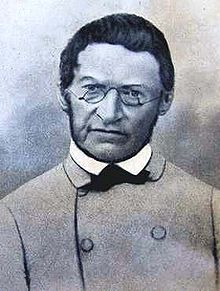Theodor Müllensiefen
Theodor Müllensiefen (born September 9, 1802 in Iserlohn ; † May 26, 1879 in Theodorshof near Rheinfelden , Switzerland ) was a German industrial pioneer and Prussian politician.
Life
Origin and entrepreneurial activity
Müllensiefen was the fourth of eleven children of needle manufacturer Peter Eberhard Müllensiefen , who also became district administrator after 1818. Due to the size of the family, he was unable to attend secondary school and instead continued his self-taught education.
Müllensiefen did an agricultural apprenticeship, but had no prospect of becoming self-employed. But he saw a market niche in the production of glass in the region. In order to gain knowledge in this branch of industry, he visited numerous glassworks in Germany, France , Switzerland , Bohemia and Italy in two years . After his return he bought the Crengeldanz estate near Witten in 1826 with the help of an older brother and built a glassworks there. At first, Johann Caspar Post was also one of the financiers. Initially, the company specialized in acid balloons and slug panes, and since 1830 sheet glass has also been added. The company faced many difficulties. Initially, the shortage of skilled workers played a role, later there was competition from staff trained at Müllensiefen such as Otto Schott . Nevertheless, the company was gradually able to assert itself. The newly designed “Müllensiefen oven” also contributed to this. The company eventually had trade relations as far as the USA . The plant was also of importance because Müllensiefen already started a distinctive internal social policy in Vormärz . The reason was certainly the desire to keep the permanent workforce. But there were also moral reasons for the theosophist Müllensiefen. Houses with a garden and a gymnasium were built for the workers. Hermann Schulze-Delitzsch praised the company as exemplary for all of Germany. In addition to the glass factory, the Müllensiefen brothers also acquired a large coal mine from 1842.
Political activity
In addition to entrepreneurial activity, Müllensiefen already expressed himself politically in Vormärz. In politics, too, he called for the ten commandments to apply. But he interpreted this in a more liberal sense and demanded in a memorandum to Friedrich Wilhelm IV the co-government of the people. In 1848 he was elected to the Prussian National Assembly for a constituency in Bochum . There he was able to contribute his experience as a practitioner to the Commission for Trade and Industry. Politically, he was opposed to the radical democrats. However, he was just as critical of the aristocratic hunting law, the death penalty and the monarch's claim to divine right. The counter-revolution in Prussia caused him to resign from his mandate. In the late 1850s, Müllensiefen was a member of the German National Association and the Prussian House of Representatives . In protest against the government's military proposal, he resigned his mandate again this time. As a result, Müllensiefen went to Switzerland , but maintained political contacts with Germany. The glass works in Witten passed to the nephews Hermann and Theodor Müllensiefen.
literature
- Barbara Gerstein: Müllensiefen, Theodor. In: New German Biography (NDB). Volume 18, Duncker & Humblot, Berlin 1997, ISBN 3-428-00199-0 , p. 311 f. ( Digitized version ).
- Friedhelm Groth: Peter Eberhard Müllensiefen, Iserlohn District Administrator from 1818 to 1836, in his relationship with the Tübingen Swedenborgian Immanuel Tafel . Iserlohn 1995, ISBN 3-924385-53-X , pp. 56-65.
- Wilhelm Schulte: Westphalian heads. 300 life pictures of important Westphalians . Aschendorff, Münster 1977, ISBN 3-402-05700-X , p. 212 f.
Web links
- Holdings of the company Müllensiefen in the Westphalian Economic Archives
- 100 years of Müllensiefen ( Memento from February 10, 2007 in the Internet Archive )
| personal data | |
|---|---|
| SURNAME | Müllensiefen, Theodor |
| BRIEF DESCRIPTION | German industrial pioneer and Prussian politician |
| DATE OF BIRTH | September 9, 1802 |
| PLACE OF BIRTH | Iserlohn |
| DATE OF DEATH | May 26, 1879 |
| Place of death | Theodorshof near Rheinfelden , Switzerland |
